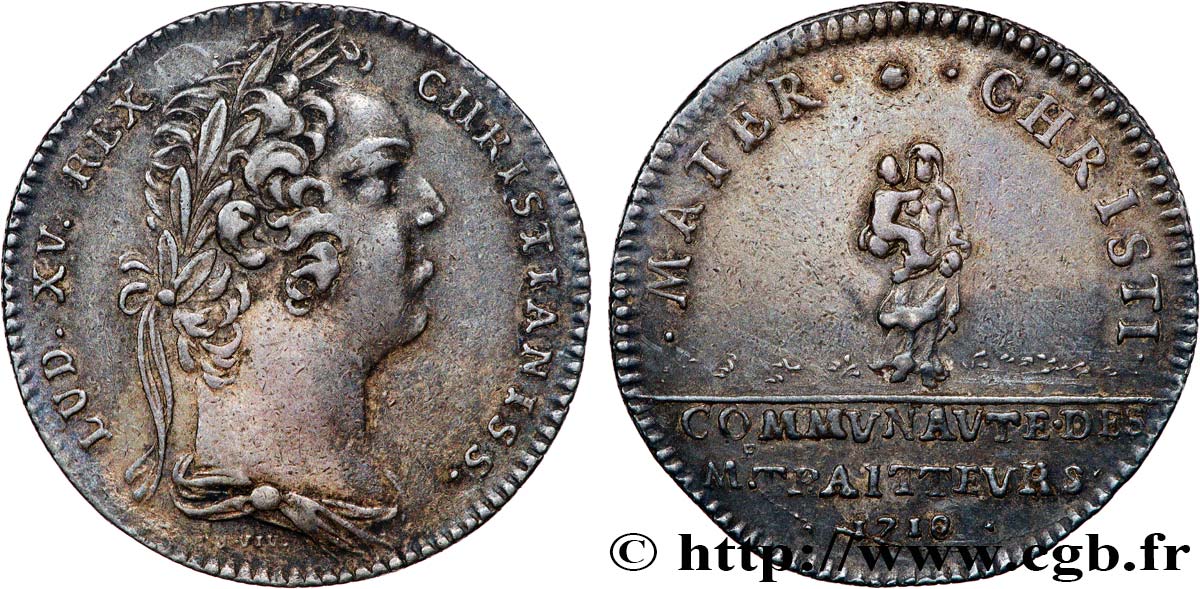fjt_699450 - CORPORATIONS - LES SIX CORPS DES MARCHANDS DE PARIS Traiteurs 1719
110.00 €
Menge
In den Warenkorb

Type : Traiteurs
Datum: 1719
Metall : Silber
Durchmesser : 27,5 mm
Gewicht : 6,64 g.
Seltenheitsgrad : R1
Kommentare zum Erhaltungszustand:
Patine sombre de collection
N° im Nachschlagewerk :
Vorderseite
Titulatur der Vorderseite LUD. XV. REX CHRISTIANISS.
Beschreibung Vorderseite Buste à droite de Louis XV signé DUVIV. [n° 308a].
Übersetzung der Vorderseite Louis XV, roi très chrétien.
Rückseite
Titulatur der Rückseite MATER. CHRISTI ; À L'EXERGUE : COMMUNAUTE. DES. ME. TRAITEURS. 1719 (9 À L'ENVERS).
Beschreibung Rückseite La Vierge debout de face, tenant dans ses bras l'enfant Jésus.
Übersetzung der Rückseite La mère du Christ.
Kommentare
Sous l'Ancien régime, le traiteur exerce une profession plus respectable que celle de tavernier, qui ne vendait que du vin, de celle du rôtisseur ou celle de cabaretier qui servait vin et repas complets, ce dernier parvenant toutefois à attirer toutes les couches de société. Les marchands de vin traiteurs, spécialisés à l'origine dans les noces et les banquets, supplantent au XVIIIe siècle tavernier, rôtisseur et cabaretier lorsqu'ils se mettent aussi à préparer les repas pour des clients fidèles ou de passage, avant d'être à leur tour supplantés par les restaurateurs à la fin du XVIIIe. Voir la fiche http://fr.wikipedia.org/wiki/Traiteur.
Under the Ancien Régime, the caterer exercised a more respectable profession than that of the tavern keeper, who only sold wine, that of the roaster or that of the cabaret keeper who served wine and complete meals, the latter nevertheless managing to attract all levels of society. Wine merchant caterers, originally specialized in weddings and banquets, supplanted the tavern keeper, roaster and cabaret keeper in the 18th century when they also began to prepare meals for loyal or passing customers, before being in turn supplanted by restaurateurs at the end of the 18th century. See the file http://fr.wikipedia.org/wiki/Traiteur
Under the Ancien Régime, the caterer exercised a more respectable profession than that of the tavern keeper, who only sold wine, that of the roaster or that of the cabaret keeper who served wine and complete meals, the latter nevertheless managing to attract all levels of society. Wine merchant caterers, originally specialized in weddings and banquets, supplanted the tavern keeper, roaster and cabaret keeper in the 18th century when they also began to prepare meals for loyal or passing customers, before being in turn supplanted by restaurateurs at the end of the 18th century. See the file http://fr.wikipedia.org/wiki/Traiteur








 Berichten über einen Fehler
Berichten über einen Fehler Die Seite drucken
Die Seite drucken Teilen meiner Auswahl
Teilen meiner Auswahl Stellen Sie eine Frage
Stellen Sie eine Frage Einlieferung/Verkauf
Einlieferung/Verkauf
 Details
Details















